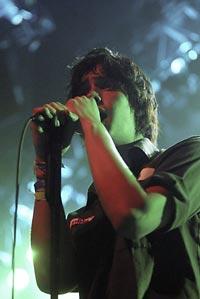Events center eyes more concerts

Julian Casablancas, lead singer of The Strokes, denounced it as "fugly."
But Qwest Field Event Center may become the mid-sized concert hall Seattle now lacks, despite the dig from the hot New York band.
First & Goal, a company owned by Paul Allen, has been talking with the world's second-largest concert promoter, AEG LIVE, about bringing more concerts to the event center, an exhibition hall at the south end of the city's pro-football stadium.
"We're constantly in discussion with different promoters, and AEG is one of them. We're always looking for ways to bring more business to that building," said Martha Fuller, chief financial officer for First & Goal, which manages the event center and stadium for Seahawks owner Allen.
More concerts at the hangarlike event center, mainly known for boat, RV, car and home shows, might be good for Seattle music fans. But such a change could hurt other venues, including city-owned KeyArena, which needs to attract more concerts if its prime tenant, the NBA's Sonics, carry out their threat to leave if the arena doesn't get a $220 million renovation.
No deal has been struck with AEG LIVE, Fuller said. But First & Goal, which leases the stadium and event center from the state, can hold almost any kind of event at the facilities.
AEG LIVE is part of Anschutz Entertainment Group, which owns or controls the Staples Center in Los Angeles and concert venues in Manhattan and a Dallas suburb.
AEG is also developing a $2.5 billion sports and entertainment complex in downtown Los Angeles.
The company was founded by billionaire Phil Anschutz, who started Qwest, the telecommunications company that bought the naming rights to the Seahawks' stadium.
A partnership between First & Goal and AEG LIVE would amount to something of a brother act. Tod Leiweke is CEO of the Seahawks and president of First & Goal; his older brother Tim is top honcho at Anschutz Entertainment Group.
The event center has attracted seven concerts in each of the past two years, including shows by Dashboard Confessional and Primus. Fuller said most of the center's 2004-05 concerts featured Latino performers, a growing entertainment phenomenon in the Seattle area.
In 2003, popular rock acts the White Stripes, Yeah Yeah Yeahs and The Strokes all played the center, which was then called Seahawks Exhibition Center.
Meeting a need
The event center could fill a potentially lucrative niche in the Seattle market, which now lacks a venue geared for shows that typically draw 5,000 to 7,000 people.
"That's the sweet spot for concerts," said Bill Alves, a Seattle City Council analyst who has studied KeyArena's finances.
Pollstar, a publication that tracks the concert industry, reported that half of the 100 top-grossing concert tours of 2004 had audiences of 2,501 to 7,500.
"There seems to be a decreasing number of acts capable of selling out a major arena," said Gary Bongiovanni, Pollstar's editor in chief.
"Many of them that fueled the concert business today date back to the 1960s and '70s, and soon that gravy train is going to end."
Consultants hired by Seattle Center reported late last year that KeyArena could make a profit without the Sonics. But that profit would rely, in part, on getting more concerts. Each concert at KeyArena nets the city about $55,000, according to the Seattle Center staff.
A city plan notes "there is a market for smaller, more intimate shows" at KeyArena. The plan, prepared by Seattle Center staff, calls for attracting more smaller-size shows by installing a $3 million curtain system that would cut the 17,000-seat arena roughly in half to create a more intimate "Key Theatre."
Creating competition
Deputy Mayor Tim Ceis and City Councilman David Della, who leads the committee that oversees KeyArena, both said they were concerned that more concerts at Qwest could hurt KeyArena.
"But there's nothing we can do to prevent that," Ceis said.
More concerts at Qwest also could hurt Seattle's 2,800-seat Paramount Theatre and the Everett Events Center, which had 15 concerts last year in the 5,000- to-7,000-ticket range, featuring artists such as Audioslave, Duran Duran, Santana and Velvet Revolver.
"Certainly another venue down the street could create competition — which can be good for the marketplace — but it is a rather fragile ecology in our business right now," said Josh LaBelle, executive director of the nonprofit Seattle Theatre Group, which owns and operates the Paramount and operates the 1,400-seat Moore Theatre.
Fuller said it's not likely the event center would see significantly more concerts until this fall and winter, the busy seasons for indoor shows.
A spokesman for AEG declined comment on any event-center plans. Fuller acknowledged the Qwest center has some "acoustic challenges." Seattle Times' music critic Patrick MacDonald, for instance, has called it the "worst venue in town."
"Conceivably, we'll be making some improvements," Fuller said.
Under the lease, the Public Stadium Authority, which oversees the stadium and event center, would have to approve any renovations.
Improvements likely would be paid for by First & Goal, or from money Qwest pays each year for naming rights.
Concerts at the event center benefit public education, Fuller noted, because the lease requires First & Goal to give 20 percent of center profits to the state's public schools. The event center has deposited roughly $530,000 in the school fund, Fuller said.
She disputed the notion that Qwest Field Event Center, which reported a total profit of $1.3 million in 2003 and 2004, might take concert business away from KeyArena or the Paramount.
"If there's a gap in the market, I'm not sure how that translates into taking business away [from another venue]. I think we're talking about attracting events to the event center and Seattle that would not be coming here, period," Fuller said.
Bob Young: 206-464-2174 or byoung@seattletimes.com
